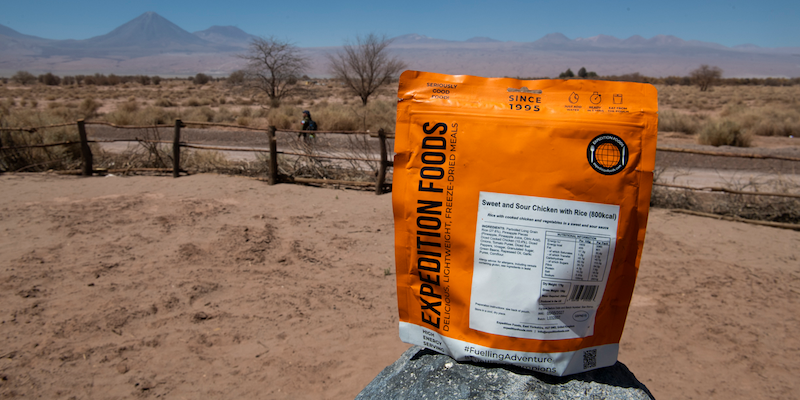-
Meals
-
Ration Packs
-
Special Diets
- Survivor Foods 25-Year Tins
-
Snacks, Drinks & Accessories
- About Us
First New York to London Solo Row - Mark Delstanche
November 11, 2021
On June 14 2021, after 97 days at sea, Mark Delstanche became the first person to row solo from New York to London.
Expedition Foods (EF): Tell us a bit about your campaign, why row an ocean? And why New York to London?
Mark Delstanche (MD): I've been a rower since the age of 13 and it's about the only sport I've ever been good at, having no aptitude for anything with a ball whatsoever. The idea to row an ocean came about whilst acclimatising at Everest base camp in 2011 when, as is often the case with too much time on my hands, the question of 'what next' sprung to mind.
Upon returning from the Himalayas I started to plan and train for a crossing from the Canaries to the Caribbean but got involved in a project to row to the Magnetic North Pole instead which gave me the taste for doing a 'world first' row. I'm originally from London, learned to row on the Thames and served as a firefighter there so it felt right to be finishing there.
Talking to other rowers, it became clear that the North Atlantic was considered one of the holy grails of ocean rowing in terms of difficulty and the idea of linking two of the worlds most iconic cities had real appeal for me rather than using arbitrary points on the coast of each continent so, the idea of New York to London was born.
EF: Where did you start and finish?
MD: I started at Liberty Landing Marina, a stones throw form the Statue of Liberty and finished at Tower Bridge in London

EF: How did you train for the crossing?
MD: About two years before the start, I started putting in some serious mileage on the rowing machine, 5 days a week. However, with a year to go, I was introduced to a personal trainer/ multiple ocean rower, Gus Barton who put the emphasis on strength building to get my body ready for the kind of torture that I was going to have to put it through. He absolutely beasted me for an entire year before the start, to the point that I was pushing out better times on the ergo than I did when I was at my peak, back in my 20's. What's more, I was really pleased to get in my boat and disappear over the horizon by the time he had finished with me, because it meant that I didn't have to train anymore.
EF: What did you eat and drink during the crossing? Did you have a daily menu?
MD: I had four compartments on deck that I'd packed randomly with all different varieties of Expedition Food meals. One for Breakfasts, one for Desserts and two for main meals. I'd pick out one from each compartment every day to see what I ended up with and packed enough for 150 days of rations.
After about 3 weeks it was apparent that I was both making great progress and would need more calories so I doubled my intake to a double breakfast, a pudding at first break, a main meal at lunchtime and a main meal and pudding for dinner. This was supplemented with a lot of Polish dried sausage called "cabanas" (which I love), pre-packed trail mix in snack bags, and biltong.
I mainly drank water and the occasional morning cuppa, but I probably only used about 20 tea bags over the 97 days I was at sea. I did take isotonic drink sachets but they went largely untouched.
EF: From the equipment that you took, what was the most useful item?
MD: The spare solar panel. Both of my main panels gave up on day 3, so I had to ration electricity thereafter, which left me with just enough for my desalinator and navigation/communications equipment. I'd have been totally stuffed without it.
EF: Did you take anything that you didn't need?
MD: I've got 480 green tea bags, and 500 ginger and lemon ones if anybody wants them!

EF: What was the best part about the row?
MD: On a few occasions, the ocean was absolutely mirror calm. The sense of peace, tranquillity and being at one with the world was amazing and taking a swim at those times was an incredible experience. That, and of course arriving at Tower Bridge to see so many people who had come to support me as well as being able to hug my family again.
EF: What were some of the biggest challenges that you faced?
MD: There were quite a few!
Apparently, the weather was the worst summer for storms for over forty years. I was hit by 8 major gales with waves the size of a two-storey house travelling towards me at 20 miles an hour or more, and I suffered 7 capsizes.
The physical effort of rowing for 12-14 hours a day on average was hard enough, however, due to the weather, I had to push hard for the last 4 days before reaching the shelter of the UK shores, as there was a large system of easterly winds coming in that threatened to push me back out in to the Atlantic. I slept for a total of 4 hours in that four days and at one stage, rowed for 27 hours pretty much non-stop and went to places in my head and body that I'd rather not have to revisit ever again.
The south coast of England also presented a huge challenge with the option of just drifting on the ocean to rest no longer a possibility. I averaged 18 hours a day of hard rowing at the oars until the final leg up the Thames which really took its toll.
Other than the sheer physical challenge, the isolation and feeling of helplessness at times was difficult to deal with, particularly given the weather forecasts which I came to dread opening. I was getting in-depth 4-day forecasts, and over the course of the 97 days, there was not a single one with wholly positive news. It would always be tainted with at least a few days of 'sub optimal' conditions which really grated after a while.
EF: How have you settled back in following such an epic journey? And have you got another expedition in mind?
MD: I was surprised by just how quickly I adapted back in to real life. I think that I'd hankered for so many aspects of my normal home life for so long that I found myself up and about at 5 in the morning as usual, blissfully happy, emptying the dishwasher, taking the bin out and picking dog poo off of the lawn!
Given what I've put my family through, my main focus now is to spend as much time as possible with them. I've never felt so content with regard to a sense of achievement and I feel that I've pushed the boundaries of my own and human endeavour far enough to sit back and enjoy the ride for a bit.
My wife has had a long held ambition to sail the South Pacific and the kids love being on boats, so that'll probably be the next big project.
EF: What would you say to aspiring ocean rowers?
MD: First, ask yourself why you want to do it and have a really good think about whether your motives will be enough to get you across the finish line. If the answer is still a resounding "YES", set a date and let everybody that you know about your plans, that way, you'll have the pressure of not being seen as a failure to others to spur you on. Sounds a bit masochistic but it worked for me!!
It's a massive outlay in terms of time and money so give yourself a couple of years (unless you're really fit and have loads of spare cash) to build up to it. You'll get disheartened at just how many rejections you'll get from potential sponsors but keep plugging away and they will come in eventually.
Get your boat sooner rather than later and get to know it and your routines inside out. I didn't and it took me over a month to figure out how to carry out the simplest of tasks in the most effective way. Sounds stupid but just figuring how to get in and out of the cabin in a big sea whilst keeping the cabin as dry as possible is an art form in itself!
Also in Stories

Government Recommended Emergency Kit
November 21, 2024

Karakoram Mountains of Northern Pakistan
October 25, 2024

Antarctic Fire Angels - Union Glacier to the South Pole
September 12, 2024


